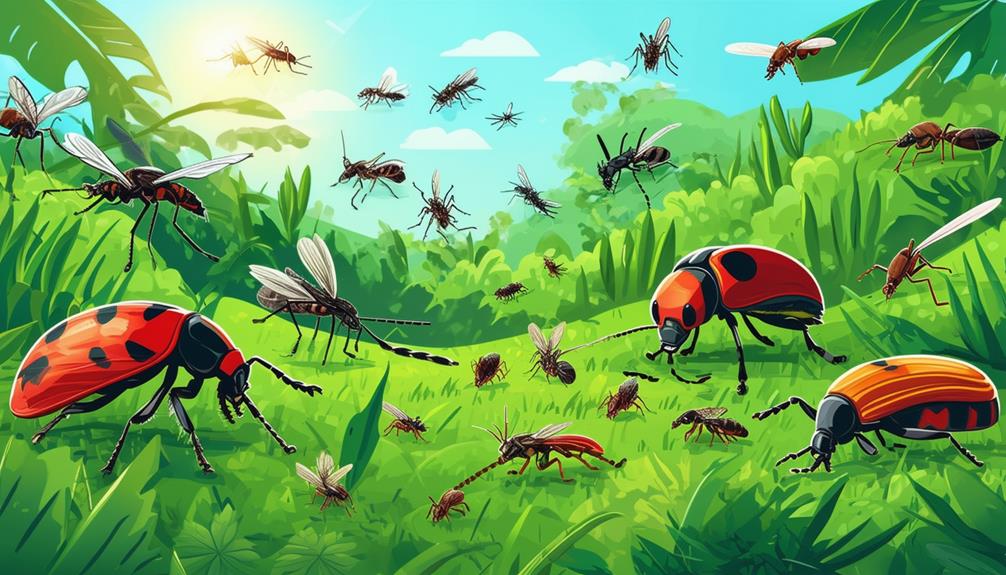When selecting mosquito repellent for your family, prioritize active ingredients like DEET, picaridin, and oil of lemon eucalyptus. These components offer effective protection against mosquitoes, ticks, and other insects. DEET provides lasting coverage, while picaridin can shield for up to 12 hours. Safety, especially for children and pregnant women, is essential. Confirm the repellent is age-appropriate and follow application instructions carefully. Consider factors like concentration levels and potential risks. Opt for EPA-registered products and consult health authorities for safe usage. Choosing wisely guarantees maximum effectiveness and safety for your loved ones.
Key Takeaways
- Consider active ingredients like DEET and picaridin for effective protection.
- Choose suitable concentrations for different age groups’ safety.
- Ensure the product contains proven active ingredients like DEET, picaridin, or oil of lemon eucalyptus.
- Prioritize safety guidelines, especially for children and pregnant women.
- Opt for EPA-registered products and follow application instructions for maximum effectiveness.
Factors to Consider When Choosing
When choosing mosquito repellent for your family, it’s essential to carefully consider various factors to guarantee maximum protection and safety. Two common active ingredients found in mosquito repellents are DEET and picaridin. DEET is a widely used ingredient that provides effective protection against mosquitoes, ticks, and other biting insects. On the other hand, picaridin is also effective and offers up to 12 hours of coverage, making it a suitable choice for extended outdoor activities.
Safety is paramount when selecting a repellent, especially for children and pregnant women. Picaridin is considered safe for these groups, providing peace of mind when using it on the whole family. While both DEET and picaridin are generally safe when used as directed, it’s essential to be aware of any potential skin irritations or reactions that may occur, although these are rare.
Importance of Active Ingredients
When choosing mosquito repellents for your family, the essential ingredients play a pivotal role in determining their effectiveness and safety. DEET, picaridin, and oil of lemon eucalyptus are key components known for their ability to repel mosquitoes.
Understanding the concentration levels suitable for different age groups is vital to guarantee adequate protection without compromising safety.
Key Active Ingredients
What makes the active ingredients in mosquito repellents so essential for protecting your family against these pesky insects? Choosing the right active ingredients like DEET, picaridin, and oil of lemon eucalyptus is vital for effective mosquito protection. DEET offers long-lasting protection against mosquitoes, ticks, and flies in various concentrations. Picaridin provides up to 12 hours of protection without feeling greasy. Oil of lemon eucalyptus, with a 30% concentration, is effective but not suitable for children under 3 years old. Selecting repellents with these key active ingredients ensures your family stays safe from mosquito bites. Here’s a table summarizing the key points:
| Active Ingredient | Protection Duration | Recommended for Children |
|---|---|---|
| DEET | Long-lasting | Yes |
| Picaridin | Up to 12 hours | Yes |
| Oil of Lemon Eucalyptus | Effective, not for <3 years old | No |
Effectiveness Against Mosquitoes
To effectively protect your family against mosquitoes, understanding the importance of active ingredients in repellents is essential. DEET, picaridin, and oil of lemon eucalyptus are proven to be effective in repelling mosquitoes.
DEET products with a concentration of 15-30% provide long-lasting protection, while picaridin at 20% concentration can offer up to 12 hours of defense. Oil of lemon eucalyptus, with a 30% concentration, is also effective at keeping mosquitoes at bay.
When selecting a mosquito repellent, opting for products containing these active ingredients will guarantee maximum effectiveness. Remember, the choice of active ingredient plays an important role in the repellent’s ability to ward off mosquitoes effectively.
Safety Considerations for Family
For best safety in selecting mosquito repellents for your family, understanding the importance of active ingredients is vital.
DEET, picaridin, and oil of lemon eucalyptus are recommended choices. DEET, at 15-30% concentration, provides long-lasting protection and is safe for children over 2 months old. Picaridin, at 20% concentration, offers up to 12 hours of protection and is suitable for infants over 2 months old. Oil of lemon eucalyptus, with a 30% concentration, is effective but not advised for children under 3 years old.
It’s essential to take into account the specific active ingredients and their concentrations to ensure the best mosquito repellent for your family’s safety.
Safety Guidelines to Follow
When selecting mosquito repellent for your family, it’s crucial to follow safety guidelines to guarantee effective protection. Choose products with EPA registration to make sure of safe and efficient use. Look for active ingredients such as DEET, picaridin, or oil of lemon eucalyptus, as these have been proven to provide excellent protection against mosquitoes. Always follow the instructions on the label carefully, especially when applying repellent on children.
Consider the balance between the risks of insect-borne diseases and the potential exposure to chemicals when choosing a repellent. It’s important to use products that are suitable for the specific insects in your area to maximize effectiveness. By adhering to these safety guidelines, you can help safeguard your family from pesky mosquito bites while minimizing any potential risks associated with repellent use.
Repellent Options for Different Needs
Consider the diverse needs of individuals when selecting mosquito repellents to guarantee maximum protection against various insects. Effective options include repellents containing DEET, picaridin, or oil of lemon eucalyptus.
DEET is a powerful ingredient that offers long-lasting defense, making it ideal for use in high mosquito areas. Picaridin is another effective choice, providing protection against mosquitoes and other insects. Oil of lemon eucalyptus is a natural alternative that’s safe for the environment and suitable for all age groups.
When choosing a repellent, opt for formulations that target common local insects for enhanced safety. Look for products that are easy to apply and reapply, ensuring maximum effectiveness during outdoor activities. By considering these options, you can select a repellent that meets your family’s needs for protection against mosquitoes and other pesky insects.
Application Tips for Maximum Protection
To achieve maximum protection against mosquitoes, make sure you apply insect repellent to exposed skin and clothing only. Follow these application tips for the best results:
- Use the appropriate amount: Make certain you apply the repellent as directed on the product label to guarantee its effectiveness.
- Avoid sensitive areas: Refrain from applying insect repellent on cuts, wounds, or irritated skin to prevent any adverse reactions.
- Supervise children: When applying insect repellent on children, ensure to oversee the process and ensure they wash it off after outdoor activities to prevent any potential harm.
Considerations for Children
Selecting the right mosquito repellent for your child involves careful consideration of their age, skin sensitivities, and the recommended active ingredients by health authorities. When choosing a repellent for your child, it’s essential to opt for products containing active ingredients like DEET, picaridin, or oil of lemon eucalyptus, which are endorsed for children by organizations such as the American Academy of Pediatrics (AAP) and the Centers for Disease Control and Prevention (CDC). Different age groups may require specific formulations, so always check the product labels for age suitability. Additionally, be mindful of any skin sensitivities or allergies your child may have, as some ingredients could cause adverse reactions. Below is a table outlining the key considerations when selecting a mosquito repellent for children:
| Consideration | Details |
|---|---|
| Active Ingredients | DEET, picaridin, oil of lemon eucalyptus are recommended for children by AAP and CDC. |
| Age Suitability | Check product labels for age-appropriate formulations. |
| Skin Sensitivities | Be cautious of potential allergic reactions or sensitivities. |
| Consultation | Seek advice from a healthcare provider for specific concerns. |
Travel-Friendly Repellents
For a convenient and worry-free outdoor experience while traveling with your family, prioritize insect repellents that are easy to carry and effective against mosquitoes, ticks, and other insects.
When selecting a travel-friendly repellent, consider the following:
- DEET Formulas: Look for repellents containing DEET, a highly effective ingredient recommended by the CDC for protection against mosquitoes and ticks.
- Picaridin Products: Opt for repellents with picaridin, a suitable alternative to DEET that’s gentle on the skin and provides long-lasting protection against various insects.
- Easy Application: Choose repellents that are easy to apply, such as wipes or sprays, for quick and hassle-free use wherever your travels take you.
Natural Repellent Alternatives
When considering ideal alternatives for mosquito protection, prioritize effectiveness over pleasant scents and opt for EPA-approved options containing DEET, picaridin, or oil of lemon eucalyptus.
While natural repellents like citronella, lemongrass, and geranium oils may offer some protection against mosquitoes, they’re generally less effective than synthetic options. Essential oils, although popular, provide limited protection and may not be as reliable as EPA-approved repellents.
It’s essential to note that the CDC advises against relying solely on natural repellents in high-risk areas for insect-borne illnesses. While natural options may have appealing scents, they often lack the long-lasting protection provided by synthetic repellents.
For ideal mosquito protection, especially in areas where mosquito-borne diseases are prevalent, it’s recommended to choose EPA-approved repellents with proven effectiveness such as DEET, picaridin, or oil of lemon eucalyptus.
Dealing With Reactions
If you notice skin irritation, rashes, or any allergic responses after applying insect repellent, it’s important to stop using the product immediately.
Mild reactions like redness or itching can often be eased with soothing lotions or antihistamines.
For severe reactions such as breathing difficulties or swelling, seek urgent medical attention.
Allergic Skin Sensitivity
In cases of allergic skin sensitivity to mosquito repellents, recognizing and promptly addressing any adverse reactions is essential for maintaining skin health. Allergic reactions may manifest as redness, itching, or a rash at the application site.
When dealing with allergic skin reactions, take these steps:
- Discontinue use of the repellent immediately.
- Wash the affected area with soap and water to remove any remaining product.
- Monitor the reaction closely, and if it persists or worsens, especially if severe irritation or blistering occurs, seek medical advice promptly.
Seeking Medical Advice
Seeking prompt medical advice is vital when addressing any adverse reactions to mosquito repellents, especially if skin irritation or rashes occur. Allergic reactions to repellents can vary, so consulting a healthcare provider if you notice any unusual symptoms after using a repellent is essential.
Immediate medical attention is necessary for severe allergic reactions, such as difficulty breathing, swelling, or dizziness, after using a mosquito repellent. Healthcare professionals can offer guidance on alternative repellents or treatments if you or your child have sensitivities to common insect repellent ingredients.
It’s important to keep a record of any reactions or symptoms experienced after using a mosquito repellent to share with your healthcare provider for an accurate assessment and appropriate advice.
Patch Test Recommended
Performing a patch test before applying mosquito repellent can help identify any potential important adverse reactions on the skin. When conducting a patch test, follow these steps:
- Apply a small amount of repellent on a small area of skin.
- Check for signs of skin irritation or allergic reactions such as redness, itching, or swelling.
- If any negative reactions occur, discontinue use of the repellent and wash the affected area with soap and water.
Patch testing is vital in identifying potential sensitivities and ensuring the safe use of mosquito repellents on the skin. Remember, always consult a healthcare provider if you experience severe or persistent reactions to insect repellents.
Comprehensive Protection Measures
Consider implementing a range of protective measures to create a thorough defense against insect bites for your family. Utilize insect repellents containing effective ingredients like DEET, picaridin, or oil of lemon eucalyptus to shield your loved ones from pesky insects. Make sure the repellents are suitable for the prevalent insects in your area and strictly adhere to the label instructions for best efficacy. Eliminate standing water sources around your home to thwart mosquito breeding grounds, and maintain a tidy yard to discourage insect infestations. Outfit your family in protective clothing and consider using insect-repellent garments for added safety. By combining these strategies, you can significantly reduce the risk of insect bites and the potential illnesses they may bring.
| Protective Measures | Description | Importance |
|---|---|---|
| Use Repellents | DEET, picaridin, or oil of lemon eucalyptus-based repellents are effective against insects. | Essential for protection |
| Remove Standing Water | Prevents mosquito breeding grounds. | Critical for mosquito control |
| Wear Protective Clothing | Provides an additional physical barrier against insect bites. | Enhances protection level |
Frequently Asked Questions
How Do I Choose the Best Mosquito Repellent?
When selecting the top mosquito repellent, take into account effectiveness, safety, and local insect threats. Give priority to EPA-registered products with DEET, picaridin, or oil of lemon eucalyptus for long-lasting protection. Follow instructions for the best defense against mosquitoes.
What Is the Best Mosquito Repellent That Actually Works?
When seeking the best mosquito repellent that actually works, prioritize options providing long-lasting protection like Picaridin-based sprays. Consider DEET alternatives for sensitive skin. Natural options may be effective but could pose skin irritation risks, as per CDC guidelines.
What to Look for When Buying Mosquito Repellent?
When buying mosquito repellent, compare ingredients, application methods, and duration of effectiveness. Consider DEET, picaridin, or oil of lemon eucalyptus for protection. Follow label instructions for safety. Balance insect risks with chemical exposure in your area.
How Can I Protect My Family From Mosquitoes?
To protect your family from mosquitoes, consider using natural solutions like essential oils, DIY options such as homemade repellents, or electronic devices like bug zappers. These methods offer alternatives to chemical-based repellents for effective mosquito control.





